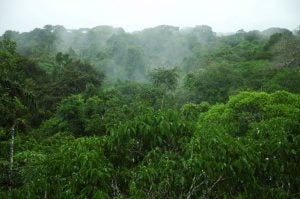This post was coauthored by Ruben Lubowski.
Stakeholders from all over the world are gathering in Glasgow for the COP26, which is shaping up to be one of the most pivotal climate change convenings. While participants will discuss how to tackle climate change and build back better (and greener), they will also focus on how to mobilize support and resources to reduce tropical deforestation.
Halting tropical deforestation is indispensable for meeting the goals of the Paris Agreement to limit temperature rise to 1.5C and for enhancing global climate action. Although forests are not included in the official negotiation agenda, during COP stakeholders will have the opportunity to turn discussion into commitments, action and finance to reduce emissions from deforestation. EDF will be closely tracking and contributing to these developments. Here’s what you should keep an eye on.
Overview of high-level developments related to forests
The COP Presidency has made it very clear that forests are essential to meeting the presidency’s goal to “secure global net zero by mid-century and keep 1.5 degrees within reach.” As countries consider how to enhance the ambition of their 2030 emissions reductions targets, the presidency has suggested that they will need to curtail deforestation, to deliver on these goals. To help do this, COP President Alok Sharma stated that “At COP26, we will work with partners to take forward action on protecting and restoring forests and critical ecosystems, and we will champion the transition towards sustainable, resilient and nature positive agriculture.”
Forests will also feature prominently during the World Leaders Summit, taking place Nov. 1 – 2. Forests and land use are expected to be one of the four pillars that world leaders will discuss in the context of what concrete actions and credible plans they can deliver to achieve COP goals and coordinate action to tackle climate change. Lastly, the UK has also launched the Forest, Agriculture and Commodity Trade (FACT) Dialogue with Indonesia as co-chairs. The dialogue is aiming to encourage both producer and consumer countries to collaborate to reform global trade in agricultural commodities to “protect forests and other ecosystems while promoting trade and development.” During COP26, FACT participant will develop a shared roadmap of actions that outlines how to advance shared international commitments and national development objectives; the roadmap will be published at the World Leaders Summit.
What are EDF and partners up to?
In addition to engaging in discussions related to the developments referenced above, EDF is also organizing several sessions around the importance of halting and reversing tropical forest loss to meeting global climate goals, enhancing climate ambition, supporting the livelihoods of Indigenous Peoples and local communities, and conserving biodiversity. In particular, EDF will focus on highlighting the vital role that tropical forest protection at scale, well-designed carbon markets for tropical forest carbon credits and scaled public-public private finance can play in helping to limit global warming to well below a 2 degree Celsius temperature increase—aiming for 1.5 degrees Celsius, as discussed in a recent article in Environmental Research Letters. You can find a full list of all of EDF’s events and information for how to tune in here.
As an official sponsor of the N4C Nature Zone, which aims to “to bring to life the momentum, action, and impact that surrounds NCS (natural climate solutions) and to create a coherent and integrated experience for the nature theme across COP26,” EDF will host several sessions related to forests and nature:
- “Building consensus on what good looks like for credits from tropical forest protection,” Nov. 3, 8:30 – 9:30: During this session, participants will share their perspectives on a process to build consensus on what “high-integrity” credits from tropical forest protection look like.
- “Building climate action ambition through forest climate solutions,” Nov. 6, 11:00 – 12:30: Participants will share new quantitative analysis and perspectives on how high-integrity forest climate solutions, including different approaches and mechanisms, can help enhance global climate action ambition.
- “Scaling up CONSERV: A model to curb legal deforestation in the Brazilian Amazon,” Nov. 8, 13:00 – 14:00: During this event, partners who have established CONSERV will share perspectives on how to scale the initiative throughout Brazil.
- “Exploring threats to forest conservation in Indigenous Territories in the Amazon,” Nov. 8, 15:35 – 16:35: This session will feature Indigenous partners from COICA, the Arara and the Xipaia peoples, who will share perspectives on threats to their territories and solutions to combat them.
EDF will also host a UNFCCC side event on Nov. 5 from 11:30 – 12:45, alongside Conservation International and Earth Innovation Institute, titled “Tropical Forest Protection – How to Determine What Good Looks Like for Carbon Credits.” Participants will explore how ensuring high quality in tropical forest credits, including through establishing REDD+ jurisdictional and nested systems, can mobilize finance to protect and restore forests at scale while supporting and respecting the rights of indigenous peoples and local communities.
In addition, EDF will participate in the program of the Marrakech Partnership on Global Climate Action Land Use Action Event on Nov. 6 from 13:30 – 16:15, discussing the importance of jurisdictional scale action to protect tropical forests and the importance of public-private finance.
Lastly, as a close partner of Emergent, administrative coordinator of the LEAF Coalition, EDF is looking forward to an exciting series of announcements and events from that initiative, and we’ll provide perspectives on the importance of jurisdictional scale fo rest protection during an event hosted at the Korea Pavilion on Tuesday, Nov. 2 from 4:00 – 6:00 pm GMT titled, “Searching for a New Model of International Cooperation with Developing Countries in the Forestry Sector to Address Climate Change.”
The time for cementing and scaling actions to halt and reverse deforestation is now, and COP26 will be instrumental in making this happen. Whether you’re in Glasgow, or tracking COP26 from afar, make sure to keep an eye on developments in the forest space.










